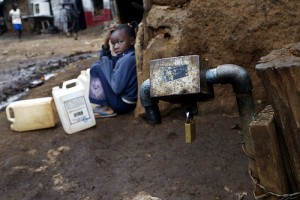This article by Philip Spiegel originally appeared here on the Palo Alto Patch.
What happens when professors of computer science, political science and business from Stanford visit a slum in Nairobi, Kenya? According to Terry Winograd they work on apps for mobile phones that can help people find water, transfer money, and walk safely through dangerous neighborhoods.
A professor of computer science, Winograd gave the Ethics at Noon lecture at Stanford Friday. He discussed an interdisciplinary course called “Designing Liberation Technologies” and its ethical implications.
For the past two years Winograd along with political science professor Joshua Cohen and businessman Zia Yusuf have taught the course to teams of students. This course is offered by Stanford’s Hasso Plattner Institute of Design (the “d.school”) to graduate students with expertise in business, computer science, design, engineering, and law. They are working with colleagues at the University of Nairobi to create mobile applications that can accelerate economic and social development in Kenya.
One of Kenya greatest problems, especially in the “informal settlement” (slum) of Kibera, is access to clean water at reasonable cost. The price fluctuates daily and no one knows how contaminated the supply may be. Buyers often walk all over town looking for water they can afford.
While water is scarce mobile phones are plentiful in Kenya. For the past two years residents of Kibera have been using the M-Maji (“mobile-water” in Swahili) database to get information about availability, price and quality from water vendors. The app is free of charge and enables users to eliminate the frustrating daily search for water.
This development is the successful outcome of design thinking at the d.school applying a user centered approach, innovation and problem solving. The Stanford design teams have been working with non-governmental organizations (NGOs) in Nairobi. Winograd said “Kibura has more NGOs than toilets.” The Umande Trust which has expertise in sanitation and water supply was Stanford’s partner in developing M-Maji.
Mathare is another informal settlement in Nairobi. The Mathare Youth Sports Association (MYSA) combines sports with community service to empower the residents. A d.school student is working with MYSA to develop a mobile AIDS counseling service which utilizes text messaging rather than face-to-face meetings which could be embarrassing.
Winograd asked “What are the ethics of Stanford coming to Kenya saying ‘We’ll solve your problems for you’?” An attendee brought up the issue of too much outside help blocking local growth and development as has been seen in Haiti after the earthquake. Another suggested that paternalism is a universal problem of NGOs and stressed the need to collaborate with people in grassroots organizations as partners.
The bottom line, Winograd said, is to “be open and honest about what you’re doing.”



